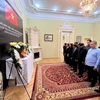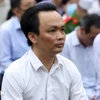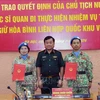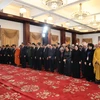National and international experts active in the urban sector are gathering at a conference which started in central Da Nang city on October 24 to discuss integrative urban development towards green and resilient cities in Vietnam.
The conference, co-hosted by the Ministry of Construction (MoC) and the German Federation Ministry for Economic Cooperation and Development (BMZ), is also looking at regional policies on urban development and planning, and learning from related projects.
According to MoC Director General of the Administration of Technical Infrastructure Nguyen Hong Tien, due to its geological and topographical location with a long coastline, Vietnam is heavily affected by climate change.
The combination of rising sea levels and river flooding makes floods in urban areas, soil erosion and growing salinity in coastal regions more serious, he said, adding that climate change also damages socio-economic activities.
Tien affirmed that urban management is one of the Vietnamese Government’s chief tasks, since it is unfolding vigorously and is directly linked to the country’s modernisation and industrialisation.
Kapil Chaudhery, Director of Spatial Decisions, an urban and regional planner in Vietnam, suggested the country enhance urban growth and expand projects to improve infrastructure, serving the increasing demand of urbanisation.
He also recommended shifting the urbanisation model from resources consumption to low energy with reduced levels of carbon emissions.
Deputy Country Director of the Asian Development Bank (ADB) in Vietnam Andrew Head underscored the reciprocal relationship between a healthy natural system and a socio-economic system.
Investment should always support social development and a sustainable ecosystem, as well as reduce the vulnerabilities caused by climate change and greenhouse emissions, he added.-VNA
The conference, co-hosted by the Ministry of Construction (MoC) and the German Federation Ministry for Economic Cooperation and Development (BMZ), is also looking at regional policies on urban development and planning, and learning from related projects.
According to MoC Director General of the Administration of Technical Infrastructure Nguyen Hong Tien, due to its geological and topographical location with a long coastline, Vietnam is heavily affected by climate change.
The combination of rising sea levels and river flooding makes floods in urban areas, soil erosion and growing salinity in coastal regions more serious, he said, adding that climate change also damages socio-economic activities.
Tien affirmed that urban management is one of the Vietnamese Government’s chief tasks, since it is unfolding vigorously and is directly linked to the country’s modernisation and industrialisation.
Kapil Chaudhery, Director of Spatial Decisions, an urban and regional planner in Vietnam, suggested the country enhance urban growth and expand projects to improve infrastructure, serving the increasing demand of urbanisation.
He also recommended shifting the urbanisation model from resources consumption to low energy with reduced levels of carbon emissions.
Deputy Country Director of the Asian Development Bank (ADB) in Vietnam Andrew Head underscored the reciprocal relationship between a healthy natural system and a socio-economic system.
Investment should always support social development and a sustainable ecosystem, as well as reduce the vulnerabilities caused by climate change and greenhouse emissions, he added.-VNA



















